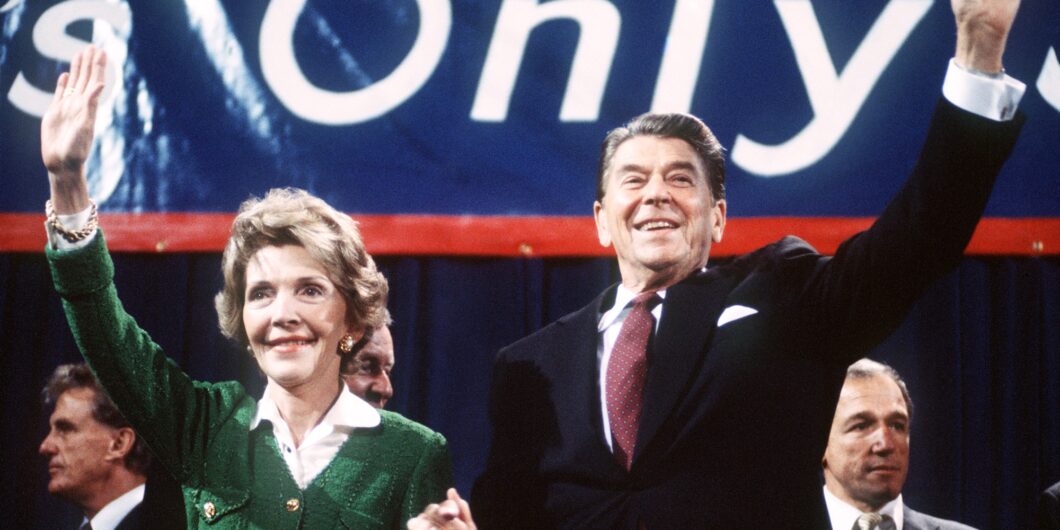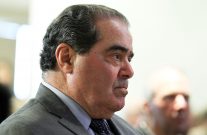The ideas of Justice Scalia remain at the center of constitutional discourse even after his death.
A Reagan-Haunted America
Donald Devine’s mission over the last few years has been to impress upon us that American conservatism, as articulated by former President Ronald Reagan, Frank Meyer, Friedrich Hayek, Milton Friedman, Eric Voegelin, among others, was not a limited, time-bound enterprise, incapable of speaking to us today. A new paperback edition titled Ronald Reagan’s Enduring Principles collects these essays from various publications distilling in one volume the case for an American conservatism guided by the principles of freedom and virtue, which these thinkers insisted should inform debates over constitutionalism, economics, and civil society.
This is not a personal remembrance of the man and the President. (Although Devine, who served as the head of the federal civil service under Reagan, does offer some instructive personal stories of his time with “The Gipper.”) Rather, Devine helps us understand, through the thought and presidency of Reagan, the philosophical underpinnings of fusionism. These were best articulated by National Review eminence Frank Meyer, who was himself learning from Hayek, Voegelin, Richard Weaver, and a host of others, in his quest to uphold American civilization from communists without and progressives within. Contrary to popular derision, Reagan was an avid reader, who imbibed this thought and made it his own. He stated as much in 1981 at the Conservative Political Action Conference:
It was Frank Meyer who reminded us that the robust individualism of the American experience was part of the deeper current of Western learning and culture. He pointed out that the civilized ideas of respect for law, an appreciation for tradition, and regard for the social consensus that gives stability to our public and private institutions must still motivate us even as we seek a new economic prosperity based on reducing government interference in the marketplace.
The term “fusion” was coined as something of an insult by Meyer’s authoritarian critic Brent Bozell in 1962. Bozell had become an integralist, one who desired the Catholic Church to sit atop the public square and fully order the life of any regime that would be virtuous and prepare its denizens for eternal life. Bozell resented what he regarded as fusionism’s philosophical error of insisting that virtue must be freely chosen to be virtue. Fusionism’s corollary was that the state couldn’t make you virtuous and was primarily limited to preventing force and fraud by citizens and defending the country against foreign enemies. Another corollary was the necessity of strong civil society, family, and religion for the formation of citizens. These spheres should not be restricted or coopted by the state, as this would lead to the diminution of these important bodies. Integralists and postliberals, then and now, can only cringe. Meyer, Bozell once said, wants to make it very difficult for man to be virtuous—by refusing to prohibit activities.
Reagan, Devine argues, strongly identified with the “philosophical” aspect of fusionism, which “represented a synthesis, at the center of which was the individual person.” Devine walks the reader through Meyer’s analysis of how he arrived at the position that the individual and the full dimensions of his personality rest at the center of social, economic, and political life. Meyer had taken to heart the scholarship of Voegelin, who argued that the overarching movement of Greek philosophy, Old Testament prophets, and Jesus Christ had laid down teachings and examples that liberated the individual from total determination by state and cultural power.
Devine quotes Larry Siedentop’s Inventing the Individual (2014) to undergird the thesis that the “morally equal individual” became the centerpiece in Western culture and tradition because the God of the Bible placed the individual as “the deciding moral agent,” who could lean “toward freedom or toward tradition in concrete situations.” But this created both a profound conservatism and a revolutionary emphasis because the person “was free to reject the family and traditions” available to them or that had formed them. Christianity itself finds its power in metaphysical unity, but it’s a unity that combined the concrete diversity of Greek rationality and Jewish tradition, as found in the embodiment of the Divine Person who did not create a kingdom for this world, nor guarantee temporal perfection, but did provide the means and end for man to find peace, among other gifts.
Here, then, is the tension of the West, the quest for divine perfection within an imperfect world and the humbling news that even in our best efforts, we fail. Most humbling of all, even when we’re sure that we’re right in our pursuit of the good, we will still fail ourselves and others in incalculable ways. But the awareness of transcendence and of our weaknesses produces “the dynamism that gave the West its creative and dominating culture.” Such fusionism, Devine observes, pieces together disparate episodes: “from the caves of Lascaux,” to Athens and Jerusalem, Augustine and the Romans, Europe and Aquinas, and on to John Locke and the American Founders, “to its dislodgment by progressivism in the early twentieth century.” Of course, this dilemma, as Meyer also learned from Voegelin, frequently leads to the desire to surmount it through ideology, to purify our politics through an overarching scientific or religious ideology.
The recovery in American political thought from New Deal Progressivism began, Devine thinks, in Hayek’s 1944 classic The Road to Serfdom, a book read closely by Reagan and Meyer. In Hayek’s later work, Law, Legislation, and Liberty (1973) he announces that “the most widely held ideas” of the twentieth century—a planned economy, liberation from “repressive and conventional morals,” and “permissive education”—will come to be seen as “superstitions” based on a wrongful faith in science and what it can provide us. The view of tradition as senseless and meaningless, Hayek thinks, will be rejected because we will understand that tradition lays down “foundations on which our capacity for rational thought rests.” Devine notes that Hayek sought in tradition and morality the “foundations” of “a free society.” Law and custom together, working with free markets, could achieve a new voluntary society, one also decentralized, that could bring new life to the West.
Reagan understood these principles, Devine notes, and attempted to place them at the center of his efforts at American revival. One note worth recalling comes from the book Reagan In His Own Hand (2001) where he elegantly voices his belief in the equal moral stature of citizens and why they shouldn’t be ordered around by bureaucrats:
But
youI wonder about the people in those cars, who they are, what they do, what they are thinking about as they head for the warmth of home & family. Come to think of it I’ve met them—oh—maybe not those particular individuals but stillII feel I know them. Some of our social planners refer to them as “the masses” which only proves they dont [sic] know them. I’ve been privileged to meet people all over this land in the special kind of way you meet them when you are campaigning. They are not “the masses,”They are individuals.or as the elitists would have it—”the common man.” They are very uncommon.individuals who make this system work.Individuals each with his or her own hopes & dreams, plans & problems and the kind of quiet courage that makes this whole country run better than just about any other place on earth.
These lines sound like an American populism that is worthy of admiration. Yet Reagan, unlike many of our contemporary populists on the Left and the Right, sought to join his belief in the folks with constitutional and free market revival, freedom, and prosperity by way of firm limits rooted in a constitutional framework.
Meyer had argued in 1964 that conservatism’s “ends cannot be attained by a political victory alone.”
Devine considers the claim that Reagan’s principles and politics are either historically outdated, or as others have claimed, Reagan would want conservatives to change with the times, with change doing tremendous work in their observation. Conservatives in the decades after Reagan repeatedly invoked his name and memory, but they also came off as an unthinking lot who failed to understand what was at stake. The fusionist conservatism that informed Reagan’s thinking and administration was by the late Bill Buckley’s reasoning in 2006 “stale” and in need of deeper reflection and a redesigned articulation. But reform implies form—the framework is good, even though work must be done to it. As G. K. Chesterton observes in Orthodoxy, those who appreciate the white fence post must work continuously to keep it in that condition.
Reagan-style thinking is now outré among members of what we now might call the American Right, many of whom reject the term conservative. We face an unprecedented set of new challenges, this group claims, and many of these problems descend from Reagan-style conservatism. Their solution typically begins with more federal power over the economy and civil society.
Senator J. D. Vance (R-OH) recently said that Reagan launched illegal immigration. Reagan left office two years after his 1986 Immigration Reform and Control Act was enacted. Three million immigrants would ultimately achieve legal status because of it, while its provisions to end illegal immigration didn’t achieve their purpose. In one crucial measure, Reagan differs vastly from Vance and the MAGA men on immigration: he fundamentally welcomed those who wanted to come to America, refusing to see them as the enemy. He attempted a compromise to reflect those sentiments. We have no evidence that he would have approved of open borders or future deals along the lines that he struck given the results.
Writer Christopher Caldwell in Age of Entitlement (2020) accuses Reagan of betraying the core reasons for his own presidential victory: he didn’t rebuff civil rights, women’s liberation, and America’s expansive foreign policy. Instead, he chose to placate multiple sets of voters with debt-financed tax cuts. As I noted in my review of Caldwell’s provocative book, “Reagan’s priorities were different from the ones that Caldwell ascribes to him. He wanted to cut taxes, end the Soviets, and reduce the size of the government.” He achieved the first two objectives while having mixed success with the third. Reagan administration lawyers began the long work of paring back the Civil Rights Act’s enforcement to focus on adhering to color-blind principles, an effort that has received recent vindication by the Court in its 2023 Harvard and UNC affirmative action decisions while being challenged by Diversity, Equity, and Inclusion initiatives throughout society. That struggle goes on.
Devine also reminds us that the more things change, the more they stay the same. The GOP obviously needs to grow its appeal among wider groups in America. Yet Reagan won in 1980 by adding white ethnics, evangelical Democrats, and then capturing larger numbers of Hispanics in 1984. Our problems in many respects were Reagan’s problems: inflation/stagflation, rampant spending, including unsustainable entitlements, bureaucratic overreach, hostile powers, and racial divisions stoked by political opponents. He dealt successfully with most of these problems. Of course, there are rarely permanent gains, only temporary victories, and defeats, sometimes delay is the only option.
We might draw an even sharper contrast between Reagan and what many conservatives have chosen in the present contest. Writing in 1967 during segregationist Alabama governor George Wallace’s third-party presidential campaign, Frank Meyer opined in National Review that “George Wallace, like every American demagogue in our history, is a populist.” What had been surprising to many, i.e., conservative opinion supporting Wallace, Meyer thought was in truth a potentiality that had been latent within postwar American conservatism from its inception. Conservatism had drawn support from diverse groups who were opposed to progressivism for their own limited and separate reasons: anti-communism, support for free markets and small government, ardent belief in individual liberties, and concern over the decay of law and order. Unable to synthesize these sentiments and experiences into a coherent and unified notion of what precisely conservatives in America were trying to conserve, many conservatives filled the void with the politics of overarching personality, Meyer added. Enter George Wallace.
The real trenchancy of his campaign was his opposition to the “arrogant and naked elitism of the Liberals, isolated from the ethics and tradition of the people.” In response to Liberalism’s imposition of “a utopian design upon the people,” populism put down its own blueprint equally removed from the constitutional order that conservatives should be conserving. Meyer posited the logical argument that just because something is opposed to liberalism that doesn’t necessarily make it worthy of our adoption. A collection of various assertions, irritabilities, and enthusiasms can be the opposite of a “political perversion” and not by that juxtaposition become a good thing. Wallace’s populism was “as alien to the American conservative conception” of constitutionalism as that of progressivism.
Wallace presented to conservatives the prospect of power conjoined with a personal style that could expel a hated elite governing class. But “style” alone is illusive, Meyer held, and such leaders, altogether lacking in substance, are just as likely “to be intellectually the prisoners, practically the administrators, of the prevailing ideologies.” The man who will change our course will be the leader whose “personal force” is joined with his “devotion to the principles upon which our civilization is founded, and because of the energy and ability he shows in fighting the ideologies and the ideologists.” Enter Ronald Reagan, a decade or so later on the national stage.
Embracing Wallace entailed conservatism abandoning its ultimate purpose, which was never political. Meyer had argued in 1964 that conservatism’s “ends cannot be attained by a political victory alone.” Conservatives must not forget that beyond political victory rests something else that does not change: “renewal of American life in the spirit of the Western and American tradition—a renewal at every level of existence: social, intellectual, philosophical, and spiritual, as well as political.” This was and remains the charge. One that Reagan, to borrow a phrase from Willmoore Kendall, lived in his hips.



